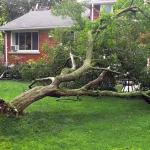Dealing with the nonrenewal of your insurance policy can feel unsettling, leaving you unsure about your next steps. Whether it’s due to increased risk, claims history, or changes in your insurer’s guidelines, it’s crucial to know how to secure new coverage and what actions you should take to ensure your assets are still protected.
Understanding Nonrenewal
When an insurance provider decides not to renew your policy, it often stems from various factors such as underwriting changes, a higher-risk profile, or the company’s business strategy. Typically, you’ll receive a notification from your insurer before the policy expires, informing you of the decision. In some states, like Missouri, insurers are required to give a 30-day written notice, including a clear reason for the nonrenewal.
Several common reasons for nonrenewal include:
- Frequent claims: Having filed multiple claims, especially for minor incidents, can lead to nonrenewal.
- Withdrawal of coverage: If your insurance company pulls out of your state or ceases offering certain coverage, they may not renew your policy.
- Late premium payments: Missing payments can prompt insurers to discontinue your coverage. If affordability is an issue, ask your provider about adjusting your coverage limits or deductible.
- Credit score issues: A sudden drop in your credit score might be seen as a risk, influencing the decision to cancel or not renew your policy.
- High-risk items: Installing things like a pool or trampoline may increase the likelihood of costly claims, prompting insurers to drop your coverage.
- Increased local risks: A rise in natural disasters or weather-related events in your area could lead your insurer to withdraw coverage.
Steps to Take After Nonrenewal
When you find out your policy won’t be renewed, it’s important to act swiftly to avoid a lapse in coverage. Here are some steps you can take to get back on track:
- Make Home Improvements
You can lower your risk profile by making simple updates to your property. Improvements like fixing faulty plumbing, installing security systems, or addressing electrical concerns can help demonstrate that you’re taking steps to minimize potential risks. - Review Your Claims History
Request a copy of your claims history report to check for any inaccuracies or discrepancies. If you find any mistakes, work with your current insurer to dispute them, which may improve your standing when applying for new coverage. - Ask for Reconsideration
If your insurer has decided not to renew, it’s worth calling them to ask if they would reconsider. Armed with your claims history and any evidence of risk reduction, you may be able to convince them to keep your policy active.
Finding New Insurance After Nonrenewal
Once you’ve received the news of your nonrenewal, it’s time to look for new insurance options. Here’s how to approach the process:
- Get Multiple Quotes
Start by requesting quotes from various insurers. Comparing rates and coverage options will help you find the best deal for your needs. Be sure to provide accurate details about your home, its value, and the improvements you’ve made. - Explore State Programs and High-Risk Coverage
If your home is considered high-risk, you might qualify for specialized state programs, such as the Fair Access to Insurance Requirements (FAIR) plan. These plans typically come with higher premiums but can offer the protection you need. - Assess Your Coverage Needs
Revisit your previous policy and evaluate whether you need any changes. For example, you might want to increase liability coverage or make sure that you have comprehensive protection for your property. - Look into Surplus Lines
In some cases, surplus lines insurers provide coverage for high-risk homes or unique situations. These specialized providers may be more flexible but can come with higher premiums.
Strengthening Your Insurance Profile
Nonrenewal can hurt your insurance history, but there are ways to improve your chances with new insurers. Here are some ways to enhance your appeal:
- Be Honest and Transparent: Always provide accurate and complete information about your home, claims history, and financial status when applying for new coverage.
- Explain Your Situation: If there were specific reasons for the nonrenewal (like a previous claim), be upfront about it. Show that you’re taking steps to address any underlying issues.
- Provide Documentation: Use your claims history and proof of improvements as supporting evidence to demonstrate that you’ve taken responsibility for past issues.
- Offer Proof of Risk Reduction: Show that you’ve made tangible efforts to improve your home’s safety, such as installing a security system, increasing your credit score, or fixing past claims issues.
The Role of Insurance Agents and Brokers
After a policy nonrenewal, working with an insurance agent or broker can be highly beneficial. These professionals have access to multiple insurance providers, allowing them to present you with a wide range of options. Here’s how they can assist you:
- Access to Multiple Providers: Brokers work with many insurers and can help you find coverage that meets your needs, especially if you’re in a high-risk category.
- Risk Assessment: They’ll assess your risk profile and help you understand how nonrenewal affects your options.
- Negotiation: Brokers are skilled in negotiating with insurers and can advocate for you to secure the best coverage at the lowest possible cost.
- Ongoing Support: Insurance brokers can also assist with claims, policy updates, and any issues that arise once you’re covered.
Final Thoughts
Dealing with a nonrenewed insurance policy can be a challenge, but by acting quickly, evaluating your options, and making necessary improvements to your risk profile, you can secure the coverage you need. Insurance agents and brokers can be valuable allies in this process, offering guidance and negotiating on your behalf. By staying proactive and transparent, you’ll improve your chances of finding suitable coverage after your policy is nonrenewed.




